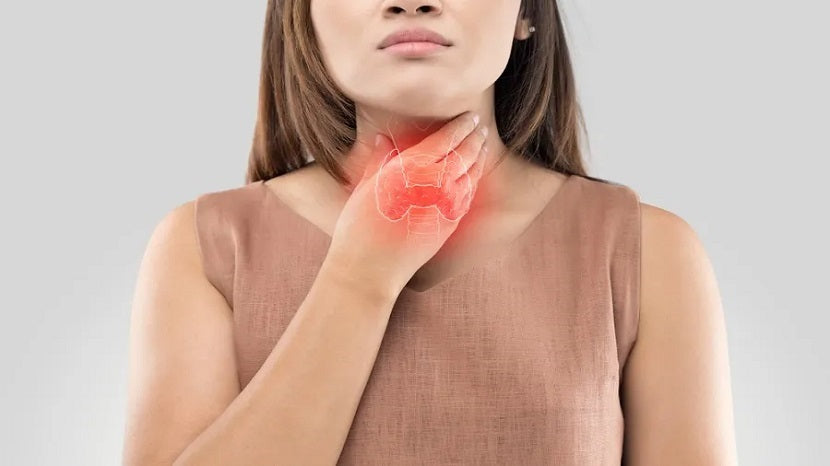Thyroid imbalances are one of the most common health issues in women today, but are they just the tip of the iceberg of a larger and more complex endocrine imbalance?
Thyroid medications are among the 10 most prescribed medications in Australia and the USA, signalling an epidemic in our midst. However, sad to say, it’s a rarely discussed medical condition in the press or the community.
What is the function of the thyroid?
The thyroid gland is part of the endocrine system, yet medically, it's only seen as a singular gland. The interactivity of the thyroid with the rest of the endocrine system is not considered, which is why women who have thyroid issues often develop secondary symptoms. These are not linked to thyroid dysfunction and leave women wondering why they are so unwell.

Each and every function in the body is connected, and the thyroid is no different. As part of the endocrine system, the thyroid plays a large role in the body’s metabolism. It maintains energy homoeostasis, which means the balance of energy production vs. energy output in the body, which is obviously a very important function. So, let’s look at what can go wrong.
Causes of thyroid imbalance
Primary:
Because of the thyroid's function of maintaining homeostasis, it plays the role of referee. If you have excessive stress levels for a long period of time, the thyroid increases energy production; then the thyroid withdraws its energy stimulation hormones. If you have excessive caffeine or other stimulants, it withdraws its energy stimulation hormones. If you have excessive circulating sugars, it withdraws its energy stimulation hormones. Got it? Stress, caffeine, and sugar. Just to name a few.
Secondary:
- The thyroid is extremely sensitive to oxidative stresses. It’s a very sensitive gland. So heavy metals, pollution, smoking, pesticides, and circulating free radicals from an unhealthy diet significantly damage thyroid tissues.
- The thyroid function is heavily dependent on certain minerals being available. Iodine is the most well-known, but zinc, selenium, and potassium are all needed - and are commonly depleted in our soils and diets. They are also commonly depleted through synthetic hormone intake from the contraceptive pill, HRT, and other hormonal devices & treatments.
- Synthetic hormones also cause an imbalance in the thyroid, by disrupting the overall endocrine system - in which the thyroid exists as an integral part. If you imbalance the endocrine control gland - the pineal - through synthetic hormones, then you disrupt thyroid function. Women often wonder why, after 20 years on the pill, they can’t seem to lose weight. Well, that’s the reason.
- Because the thyroid is such a sensitive gland, it reacts to immunological factors that destroy tissues. People with food sensitivities to gluten, sugar, and dairy often develop autoimmune thyroid issues such as Hashimoto's thyroiditis, which is at epidemic proportions now.
- There is a very strong argument that the blanket prescription of hormones has a strong effect on reducing thyroid function. And this might explain why we see such high rates of thyroid issues today.
If you put these elements together it’s no wonder that thyroid issues are so prevalent.

Testing
Testing is relatively simple through blood tests and relies on checking thyroid levels T4 and T3.
T3 is the more bioactive form of thyroxine. Checking Thyroid Stimulating Hormone also indicates pre-clinical or poorly managed medication levels. An old method of checking sub-clinical thyroid levels is to take your temperature before getting out of bed first thing in the morning on the 2nd, 3rd, and 4th day of your menstrual cycle.
For men and post-menopausal women, you can do it at any time of the month. If the temperature is below 36.3, then chances are you have a subclinical or clinical thyroid issue. It’s not a perfect science, but it can be a good self-test to begin before going to the doctor.
Treatment
The current treatment method is to provide the body with missing thyroid hormones. There are now more bioactive versions of thyroxine available from pigs and even thyroid extract - which the body responds to better, but the issue is that the dose needs to be perfect.
Generally, over time, the body produces less and less thyroxine because the underlying issues remain untreated. So there needs to be a better way.
Note: If you have thyroid issues, then don’t stop your medication. It’s essential to continue until the thyroid restores its full function.

Holistic treatments
Step 1: You need to re-stimulate thyroid function. The most effective way to do this is by using kelp. Simple old kelp is high in iodine and other co-factors for improving thyroid function.
Step 2: Take the supporting minerals Zinc, Selenium, Potassium, and Iodine, which are involved in the manufacture of thyroxine, and convert thyroxine into bioavailable T3 in the body. Iodine can be taken through the skin by applying iodine tincture to the soft parts of your body after showering each day.
Step 3: Remove all reactive food groups. So remove gluten, sugar, and dairy from your diet. It sounds simple, but it’s quite difficult with so much of the Western diet containing these foods. It can be argued that the sheer volume of these reactive foods in our diets has established these intolerances, but GM production and food manufacturing also play some role.
Step 4: Treat the larger endocrine imbalance.
Step 5: Manage stress levels. Constant, high, medium, or even low-grade stress is the thyroid's worst enemy. So regular exercise, yoga, and meditation are very important.
Parting Words
I hope this sheds some light on the complex and prevalent issues of thyroid disorders. Once established, these disorders are difficult to treat, but in time, it’s worth the effort - with weight becoming easier to manage, better sleep, more energy, and feeling less moody and irritable.

REFERENCES
Xin Sun, Zhongyan Shan and Weiping Teng. Effects of Increased Iodine Intake on Thyroid Disorders. Endocrinology and Metabolism. 2014 Sep;29(3):240-247.
https://doi.org/10.3803/EnM.2014.29.3.240
Surks MI. Iodine-induced thyroid deficiency. Ross, DS and Mulder JE (Eds). UpToDate. Waltham, MA: UpToDate Inc. Accessed Aug. 5, 2020.
https://www.uptodate.com/contents/iodine-induced-thyroid-dysfunction








Leave a comment
This site is protected by hCaptcha and the hCaptcha Privacy Policy and Terms of Service apply.